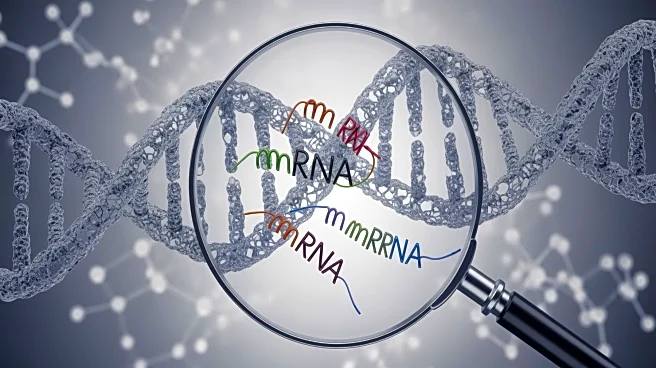What's Happening?
At the American Society for Human Genetics (ASHG) Annual Meeting, researchers from the University of Chicago and Columbia University introduced a new computational workflow named Torino. This tool is designed to analyze RNA-seq data to identify novel
mRNA isoforms, which are variants of genes that can have different functions and expression patterns. The study highlights the importance of these isoforms in understanding disease mechanisms, such as cancer, and the impact of genetic variations. Torino uses biobank-scale RNA-seq data to decode transcript structures and expression levels, revealing thousands of previously unannotated isoforms. This discovery is significant as it uncovers the complexity of RNA processing and its genetic architecture, which are crucial for understanding diseases.
Why It's Important?
The development of Torino is a significant advancement in the field of oncogenomics and genetic research. By identifying novel mRNA isoforms, researchers can gain deeper insights into the genetic underpinnings of diseases like cancer. This can lead to the identification of new therapeutic targets and improve the understanding of disease progression. The ability to uncover unannotated splicing events and their genetic control could reveal hidden drivers of diseases, potentially leading to breakthroughs in treatment strategies. The findings from Torino's application to Alzheimer's disease samples also suggest that RNA processing defects may play a role in disease progression, highlighting the broader implications of this research in understanding complex diseases.
What's Next?
The Torino workflow opens new avenues for research into the regulatory genome across various tissues, species, and complex diseases. Future studies may focus on applying Torino to a wider range of samples to further explore the genetic control of RNA processing. This could lead to the discovery of additional disease-linked variants and provide a more comprehensive understanding of the genetic factors involved in disease mechanisms. Researchers may also investigate the potential for developing targeted therapies based on the novel isoforms identified by Torino, which could revolutionize treatment approaches for diseases like cancer and Alzheimer's.
Beyond the Headlines
The introduction of Torino highlights the evolving landscape of genetic research, where computational tools are increasingly used to decode complex biological data. This development underscores the importance of integrating advanced computational methods with traditional genetic research to uncover new insights into disease mechanisms. The findings from Torino also emphasize the need for continued exploration of RNA processing and its role in disease, which could lead to a paradigm shift in how genetic diseases are understood and treated.















